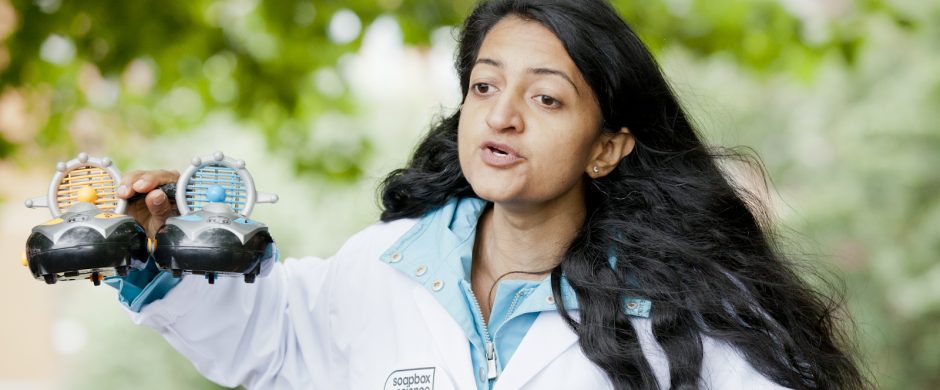.
Swansea will be hosting their second Soapbox Science event on Saturday 6th June 2015. Our soapboxes will be positioned overlooking the magnificent expanse of Swansea Bay next to the 360 Beach and Watersports centre and café. The Bay will be buzzing with cyclists, joggers, dog walkers, and families out for a walk – we aim to stop them in their tracks with women at the forefront of science and technology from all over Wales talking about their research! The event’s mission is to raise the profile of women in STEM subjects. If you’d like to see what Soapbox Science looks like in action, have a look at the Soapbox Science 2012 video
Details of the location and timing of the event
Date: Saturday 6th June 2015
Address: 360 Beach and Watersports Cafe, Mumbles Road, Swansea SA2 0AY
Time: 12-4 pm
Sponsorship
We could not run this Swansea event without the generous logistical and financial support of our sponsors. Our Swansea events have been supported generously from the start by Swansea University and, for 2015, its EPSRC-funded Impact Accelaration Account.
The Wales Institute of Mathematical and Computational Sciences (WIMCS) is also sponsoring our Swansea event, as well as Dr Elaine Crooks and Dr Monika Seisenberger. WIMCS is a collaborative partnership of the universities of Aberystwyth, Bangor, Cardiff, South Wales and Swansea. Established in 2006 by the Welsh Government through the Higher Education Funding Council for Wales, WIMCS aims to enhance the standing of mathematics and computation in Wales, to foster links with industry, commerce and business, to generate substantial research funding and to provide a forum for education and public awareness of the Mathematical Sciences.
The Society of Biology is also sponsoring our event. The Society is a single unified voice for biology: advising Government and influencing policy, advancing education and professional development, supporting our members and engaging and encouraging public interest in the life sciences. The 2015 grant scheme is themed by ‘Biology: Changing the World’, a project celebrating great biologists and aims to inspire and enthuse future biologists.
The British Society of Soil Science (BSSS) supports our event in Swansea. Together with its professional body the Institute of Professional Soil Scientists (IPSS), it aims to promote the study and profession of soil science. BSSS acts as a forum for the exchange of ideas and provides a framework for representing the views of soil scientists to other organisations and decision making bodies. It promotes research by organising several conferences each year and by the publication of its two scientific journals, the European Journal of Soil Science, and Soil Use and Management. It promotes education through a number of initiatives aimed at schools, colleges and universities.
PHYCONET is pleased to be sponsoring ‘The wonders of microalgae’ at this year’s Soapbox Science event in Swansea. PHYCONET is a Biotechnology and Biological Sciences Research Council Network in Industrial Biotechnology and Bioenergy (BBSRC NIBB), a UK-based network enabling biologists, engineers and industrial partners to consolidate their knowledge and expertise to unlock the industrial potential of microalgae. The focus of PHYCONET is on producing high value products from microalgae industrially cultivated in an intensive and controlled manner using photobioreactor and fermenter-based technologies. One of the objectives of PHYCONET is to promote the profile of algal research in the UK. Dr Carole Llewellyn at Swansea University will be Soapboxing how microalgae can help solve environmental issues associated with industrial CO2 flue gas emissions and wastewater and how they can be used as a natural renewable source to produce healthy foods and other products.
The Natural Environment Research Council is sponsoring Drs Sarah Dalesman & Carrie Lear. The Natural Environment Research Council is the UK’s largest funder of independent environmental science, training and innovation, delivered through universities and research centres. Formed by Royal Charter in 1965, the Natural Environment Research Council marks its 50th anniversary in 2015. Throughout NERC’s Summer of Science, NERC researchers (such as Sarah and Carrie) will be taking their work and enthusiasm out to the public, branching out from the usual science festival venues into shopping centres, music festivals, pubs and even beaches.
Speakers
Prof Karen Holford (@karenholford), Cardiff University “Engineered structures for future societal needs”
Dr Laura Wilkinson (@LLWSwansea), Swansea University “Why do I always have room for dessert? How the variety effect shapes our everyday decisions about meals and snacks.”
Miss Jessica Fletcher (@ScienceSheWrote), Bangor University “Super Yeast! – Beer, Bread and Better Health”
Dr Elaine Crooks, Swansea University “How to get the best out of your image: feature extraction and image processing”
Dr Sarah Dalesman (@Snail_memory), Aberystwyth University “Are snails intelligent?”
Dr Emilia Urbanek (@urbanek78), Swansea University “Soil carbon – we can’t afford to lose it”
Dr Alison Paul, Cardiff University “Targeted delivery of anti-cancer drugs”
Dr Cecile Charbonneau (@info_specific), Swansea University “New manufacturing techniques and innovative low-cost materials for the fabrication of photovoltaic devices“
Ms Anna Beres, Bangor University “How speakers of two languages, such as Welsh and English, can best use their bilingual brains to learn new information”
Dr Anna Seager (@AnnaLSeager), Swansea University “Poisons, toxins, danger- we are constantly bombarded by potential toxins in our everyday lives, in the worls around us. How do we stay alive?!”
Dr Carrie Lear (@CarolineLear), Cardiff University “The chemistry of fossil shells shows that the Antarctic ice sheet melted when climate warmed in the past”
Dr Monika Seisenberger (@M_Seisenberger), Swansea University “Correctness of Programs: Verification of Railway Control Systems”
Dr Rebecca Price-Davies (@rpricedavies), Cardiff University “How intravenous nutrition works: a lifeline for people who can’t eat food ”
Dr Carole Llewellyn (@EnAlgae_NWE), Swansea University “Exploring the wonders of microalgae to tackle global societal challenges”
Dr Tina Joshi (@tinaljoshi), Cardiff University “Microwaving superbugs – transforming point-of-care diagnostics”
Dr Karin Ennser (@karin_box), Swansea University “Applied photonics in our life”
